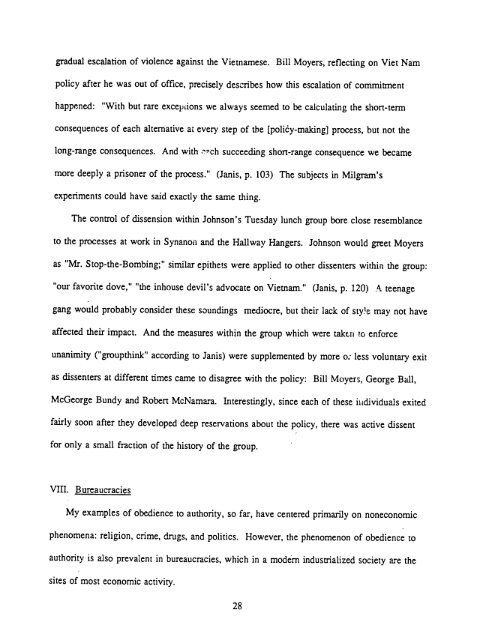INSTITUTE FOR
INSTITUTE FOR
INSTITUTE FOR
Create successful ePaper yourself
Turn your PDF publications into a flip-book with our unique Google optimized e-Paper software.
gradual escalation of violence against the Vietnamese. Bill Moyers, reflecting on Viet Nam<br />
policy after he was out of office, precisely describes how this escalation of commitment<br />
happened: "With but rare excepions we always seemed to be calculating the short-term<br />
consequences of each alternative at every step of the [polidy-making] process, but not the<br />
long-range consequences. And with .ch succeeding short-range consequence we became<br />
more deeply a prisoner of the process." (Janis, p. 103) The subjects in Milgram's<br />
experiments could have said exactly the same thing.<br />
The control of dissension within Johnson's Tuesday lunch group bore close resemblance<br />
to the processes at work in Synanon and the Hallway Hangers. Johnson would greet Moyers<br />
as "Mr. Stop-the-Bombing;" similar epithets were applied to other dissenters within the group:<br />
"our favorite dove," "the inhouse devil's advocate on Vietnam." (Janis, p. 120) A teenage<br />
gang would probably consider these soundings mediocre, but their lack of sty!e may not have<br />
affected their impact. And the measures within the group which were tak.rn to enforce<br />
unanimity ("groupthink" according to Janis) were supplemented by more o: less voluntary exit<br />
as dissenters at different times came to disagree with the policy: Bill Moyers, George Ball,<br />
McGeorge Bundy and Robert McNamara. hiterestingly, since each of these iiidividuals exited<br />
fairly soon after they developed deep reservations about the policy, there was active dissent<br />
for only a small fraction of the history of the group.<br />
VIII. Bureaucracies<br />
My examples of obedience to authority, so far, have centered primarily on noneconomic<br />
phenomena: religion, crime, drugs, and politics. However, the phenomenon of obedience to<br />
authority is also prevalent in bureaucracies, which in a modern industrialized society are the<br />
sites of most economic activity.<br />
28

















